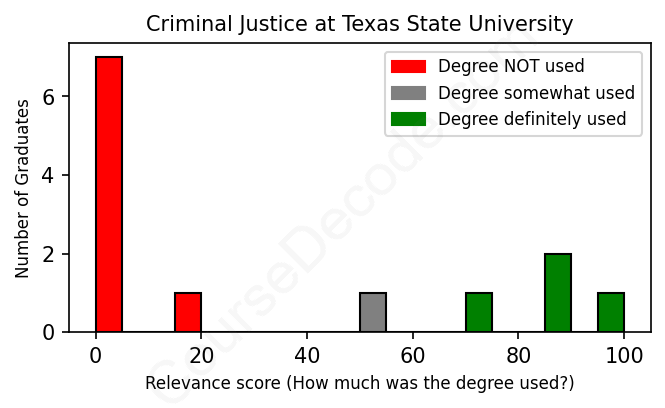
First, some facts. Of the Criminal Justice graduates from Texas State University we've analyzed , here's how many have used (or NOT used) their degree in their career:

These are estimates based on AI analysis of 13 LinkedIn profiles (see below).
The verdict? Horrible! Overall, with an average relevance score of 31%, Criminal Justice graduates from Texas State University have an exceptionally lower likelihood (-36%) of finding work in this field compared to the average graduate across all fields:
And for comparison, here's the chart for all profiles we've looked at across all degrees.
Also, after graduating, only 30% of these graduates have pursued further education other than another Bachelor's degree (such as a Masters degree or other), compared to the average across all profiles of 35%. This suggests a Bachelors degree is enough for most Criminal Justice graduates, and it's normal to look for work straight after graduation.
See the details:
|
Relevance score: 15% We think this person has NOT gone into a career related to their degree. We think this person has NOT gone into a career related to their degree.
DEGREE INFOGraduated in 2010 from Texas State University with a Bachelor's degree in Criminal Justice. No other secondary education since. JOB HISTORY SINCE GRADUATIONBartender RIO Feb 2013 - Mar 2016 Bar Manager  Normans Dueling pianos Feb 2018 - Jul 2019 Bar Manager  AC Hotels Jun 2019 - Sep 2020 AGM  Bungalow Heights Dec 2020 - Jan 2024 Food and Beverage Manager  Revolution Soccer Complex Apr 2023 - Present ABOUTNo information provided. |
The top 10 most common jobs done by the graduates we've analyzed (ranked most common to least) are:
Looking at the career paths of students who graduated with a Criminal Justice degree from Texas State University, it seems like a lot of them ended up in jobs that don't really connect to their field of study. Many found themselves in roles like sales representatives, marketing coordinators, and various positions in the hospitality industry. For example, several alumni ended up working in bars or hospitality management, which are jobs that focus more on customer service and business than on criminal justice-related tasks. Even those who did land roles in domains that could be somewhat relevant, like the Security Specialist or the Assets Protection Team Leader at Target, still didn’t fully tap into their criminal justice backgrounds as much as one might expect.
On the flipside, there were a handful of graduates who took roles that genuinely connected to criminal justice themes. Positions like Victim Advocate and Legal Assistant highlight how some individuals found meaningful ways to put their degree to use, engaging directly with victims and legal systems. But overall, it looks like while some found rewarding paths in the criminal justice arena, a large number took jobs that seem pretty unrelated to their studies. It's a reminder that not every degree leads directly to a specific career, and many graduates may have to explore different fields before finding their niche.
Here is a visual representation of the most common words in job titles for Criminal Justice graduates (this is across all Criminal Justice graduates we've analyzed, not just those who went to Texas State University):

When you look at the career paths of Texas State University graduates with Criminal Justice degrees, it really shows a mixed bag. Right out of college, many of them seem to jump into roles that aren’t directly related to criminal justice. For instance, some have worked in sales, hospitality, and even tech positions. This could suggest that while they might have many skills from their education, they sometimes struggle to land jobs that directly tie into their degree right after graduating.
Fast forward five to ten years, and the picture doesn't necessarily get clearer. Some have carved out noteworthy careers, particularly in roles connected to community service, victim advocacy, and legal assistance. However, a sizable number have drifted into unrelated fields, like marketing, logistics, or mechanics. While it’s great to see some graduates making real impacts in areas like victim advocacy or corporate roles, it’s pretty clear that not every grad is landing a role that aligns perfectly with their studies. So, if you’re thinking about majoring in Criminal Justice, it’s good to stay flexible and open-minded about where a degree might take you!
Getting a Bachelor’s degree in Criminal Justice at Texas State University is generally considered to be on the moderate side in terms of difficulty. While you’ll definitely have to put in your fair share of work, the courses are designed to be engaging and often involve real-world applications, making it easier to stay interested. There are plenty of projects, papers, and possibly even some hands-on experiences involved, but if you manage your time well and stay organized, it’s totally manageable. Overall, it’s not as tough as some of the more technical or math-heavy degrees, but it will still challenge you to think critically about the justice system and social issues. Just keep up with your readings and assignments, and you should be good to go!
Most commonly, in the LinkedIn profiles we've looked at, it takes people 4 years to finish a Bachelor degree in Criminal Justice.
Looking at these Texas State University grads, it seems like they're pretty mixed in terms of how much money they're making. Some of the folks, especially those in tech or sales, like the developers and account execs, likely have decent salaries—especially since jobs in those fields often pay well as you gain experience. On the flip side, roles like bartending or some of the non-profit work might not generate as much cash. Overall, it seems like some are on solid financial footing, especially those who climbed the corporate ladder or got into tech, while others are probably still hustling to make ends meet, especially if they’re in lower-paying positions. So, it's kind of a mixed bag!
Here is a visual representation of the most common words seen in the "about" section of LinkedIn profiles who have a Bachelor degree in Criminal Justice (this is across all Criminal Justice graduates we've analyzed, not just those who went to Texas State University). This may or may not be useful:

Here are all colleges offering a Bachelor degree in Criminal Justice (ordered by the average relevance score of their Criminal Justice graduates, best to worst) where we have analyzed at least 10 of their graduates: